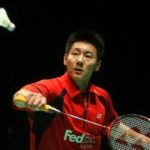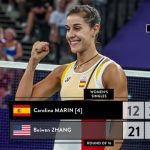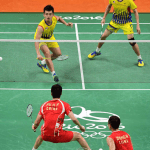
Denmark Continues Medal Pursuit
Kim Astrup and Anders Skaarup Rasmussen are getting better with time.

Despite being in their 30s, the Danish duo remains in their prime (Astrup is 32, Rasmussen is 35), continuing to surprise everyone by avenging their loss to World Champions Kang Min-hyuk and Seo Seung-jae and maintaining their medal contention.
A year ago, they unexpectedly reached the World Championship final (losing to Kang Jeong-ho and Seo Seung-jae), and since then, they have kept up an understated level of performance. At the 2024 Paris Olympics, they advanced from the ‘group of death’ and played another shrewd and defensively solid game, saving two game points in the second game to defeat the Korean pair in straight games.
Inevitably, people began talking about their loss at last year’s World Championship on home soil.

“This match felt a bit like the (World Championship),” Rasmussen said. “We talked a lot about how to turn things around if we found ourselves in the same situation… but talking is one thing, doing is another. We handled it very well, and I’m proud of our performance.
“From now on, you can play two matches, and winning either one gets you a medal. In this arena, we have two more matches, and we will forever be grateful for that. Playing in that hall is just crazy and magical.”
“It’s almost like playing in the Royal Arena at the World Championship,” his partner added, referring to the audience. “We didn’t expect to experience this feeling again. Now we have two more chances to enter this arena, and hopefully, it won’t just be for a bronze medal match.”
Next, they will face Olympic champions Lee Yang and Wang Chi-lin again, having lost to them in the group stage. In the other half of the draw, top seeds Liang Weikeng and Wang Chang will take on Aaron Chia and Soh Wooi Yik.
The Malaysian pair Chia and Soh turned the tables against their nemesis Satwiksairaj Rankireddy and Chirag Shetty. After losing the last three matches to the Indian pair, the Malaysians seemed overwhelmed early on until they played a game that could suppress their opponents.
“They were attacking us all the time,” Shetty recalled, still stunned by the loss that kept them from becoming the first Indian doubles pair to reach the Olympic semifinals.
He meant that the Malaysians dominated the brief exchanges before the serve; the longer the rallies went, the more likely the Indians were to play winning shots.

“We let them come back with a 4-0 run in the second half,” Shetty said. “We played quite easily and should have led before the interval, but the score got closer. Credit to them, they kept pushing us. We are disappointed not to have won… but life goes on.”
“It’s definitely a big heartbreak,” lamented Rankireddy. “We’ve experienced similar heartbreaks before, but we’ve gotten used to it. We wanted to do well for our coach, who works very hard, even harder than us. We felt very positive on the court, thinking this would be our day. I felt we were comfortable in defense as well. But they kept attacking us in the 1-2-3 shots, and when the counterattack began, we got those points. This was a good lesson for us. They were more stable than we were.”












